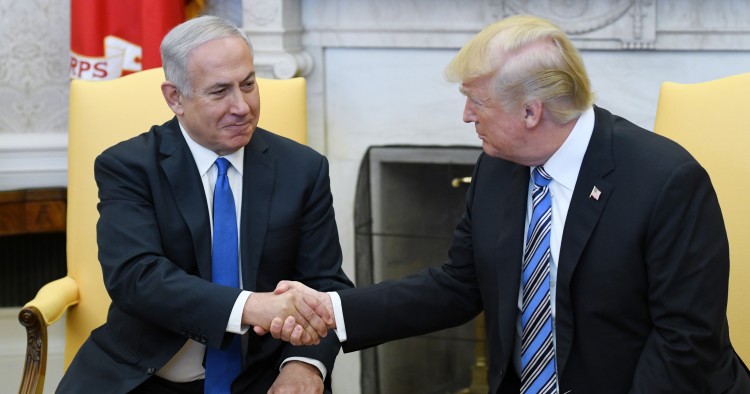After U.S. Vice President Mike Pence laid out the Trump administration’s agenda in a speech earlier this year before Israel’s parliament, the Knesset, one attendee asked, “was that the messiah or the vice president of the United States?”
Benjamin Netanyahu must think that he has died and gone to heaven. Donald Trump’s presidency is everything the Israeli prime minister could have wished for. From Iran to Palestine, the Trump agenda is as close to a mirror image of Israeli preferences as any since Israel’s establishment.
But Trump’s unprecedented willingness to accommodate and support a broad Israeli agenda is also a problem. It threatens to breed a dangerously complacent assumption that the president, supported by a cast of Israel stalwarts, is in Israel’s pocket. This dangerous conclusion may very well stoke more Israeli militancy than Washington is actually prepared to accept. As Israeli Prime Minister Benjamin Netanyahu confronts both the challenges and opportunities that are certain to arise, his biggest challenge may be to restrain his appetite for dramatic policy initiatives on Iran, the Golan Heights, and settlements, lest he awaken the slumbering giant in Washington.
All U.S. presidents since Richard Nixon have dutifully upheld the foundational pact at the heart of Israel’s national security doctrine: promising support for maintaining Israel’s superiority in conventional weapons as long as the policy of nuclear ambiguity—by which Israel’s nuclear arsenal is undeclared—is maintained.
Beyond this essential commitment, however, the scope for policy confrontation is real. From Dwight Eisenhower to George Bush, Israel and Washington have clashed over issues of great import. In the first six months of 2009, there was real fear in Jerusalem about newly elected President Barack Obama’s demand that Israel freeze settlement expansion in the West Bank and East Jerusalem, and after Obama’s Cairo speech, that he would open a new page in Israel’s relations with the Arab world at Israel’s expense.
Trump presents a challenge of a different but no less consequential sort. Instead of confronting Jerusalem, Trump has joined it, most notably on Iran. Netanyahu was never reconciled to the 2015 Iran nuclear deal and his unprecedented confrontation with the Obama administration offered a measure of the estrangement between the two leaders. In contrast to Obama, Netanyahu has found a soul mate in Trump, who has repudiated the consensus of the national security establishments in both Washington and Jerusalem by reneging on the agreement.
Netanyahu, however, cannot let Trump’s enthusiasm go to his head. He must be wary not only of overreaching on Iran but also of overestimating Trump’s commitment to his policies. Washington’s breezy support for regime change in Tehran and the vocal support for such an option within Netanyahu’s ranks may well feed a false and dangerous sense of the prospects for such a “victory.”
The scope for Israeli action against Iran is greatest in the Syrian context. But here Israel’s main collaborator is Moscow, not Washington. Until now, the Trump administration—whose preference in Syria has been to decrease the U.S.’s footprint—has been content to defer to joint Israeli-Russian efforts to constrain, if not eliminate, Iran’s and Hezbollah’s role in Syria. Netanyahu has taken measure of Washington’s disinterest and is collaborating closely, and so far successfully, with Moscow.
Netanyahu and Vladimir Putin’s close relationship has yet to raise Washington’s hackles, even when Israel pointedly refused in March to join in condemning Moscow for the assassination attempt against defector Sergei Skripal and his daughter, a repeat of Israel’s 2014 decision not to condemn Russia’s annexation of Crimea.
The Golan Heights offers another opportunity for Netanyahu to misjudge Washington’s support for his agenda. Already, two years ago, Netanyahu argued“for the international community to recognize reality, especially two basic facts. One, whatever is beyond the border, the boundary itself will not change. Two, after 50 years, the time has come for the international community to finally recognize that the Golan Heights will remain under Israel’s sovereignty permanently.”
Trump recognizing Israeli sovereignty over the Golan Heights would fit nicely into the paradigm he established when he recognized Jerusalem as Israel’s capital. Indeed, Intelligence Minister Yisrael Katz described the effort to win Trump’s approval of Israel’s 51-year hold on the Golan as the proposal now “topping the agenda” in bilateral diplomatic talks with the U.S.
“I reckon there is great ripeness and a high probability this will happen,” he said. Asked if such a decision could be made this year, he added: “Yes, give or take a few months.”
For the moment, such an ask is a bridge too far.
So too for Jerusalem and settlements, where it would seem that Trump is prepared to accept whatever Israel proposes. Netanyahu, flush with his policy victory on Jerusalem, has nonetheless been circumspect about efforts within his ruling coalition to unilaterally advance major departures in the continuing incremental annexation of the West Bank. Nor has he opened the floodgates to new settlement construction beyond what has become usual and customary for Israel over the last half century. The biggest constraint to settlement expansion is a weak Israeli housing market, a fact that Trump, however great his powers, cannot change.
Netanyahu is not a gambler by nature. Unlike Ariel Sharon, he has little appetite for using military force to crush the Palestinian quest for sovereignty. He must be wary of the “green light” Washington is signaling, lest Trump turn out to be another false messiah.
Photo by Olivier Douliery-Pool/Getty Images
The Middle East Institute (MEI) is an independent, non-partisan, non-for-profit, educational organization. It does not engage in advocacy and its scholars’ opinions are their own. MEI welcomes financial donations, but retains sole editorial control over its work and its publications reflect only the authors’ views. For a listing of MEI donors, please click here.













